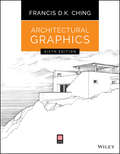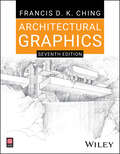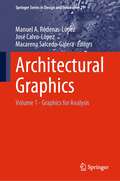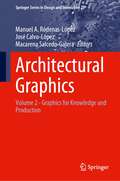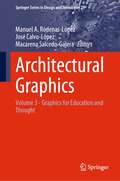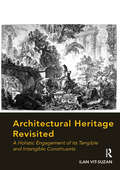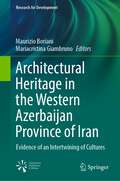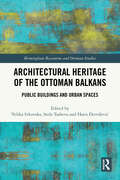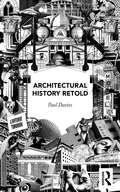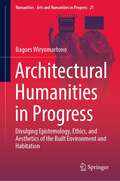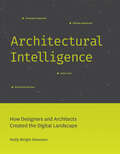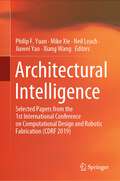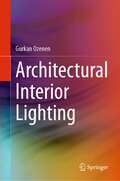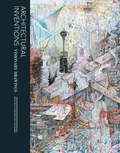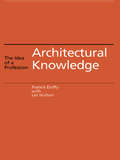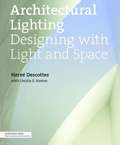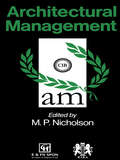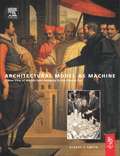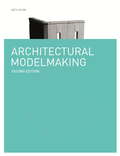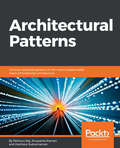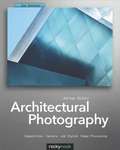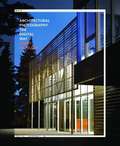- Table View
- List View
Architectural Graphics
by Francis D. ChingThe bestselling guide to architectural drawing, with new information, examples, and resources Architectural Graphics is the classic bestselling reference by one of the leading global authorities on architectural design drawing, Francis D.K. Ching. Now in its sixth edition, this essential guide offers a comprehensive introduction to using graphic tools and drafting conventions to translate architectural ideas into effective visual presentations, using hundreds of the author's distinctive drawings to illustrate the topic effectively. This updated edition includes new information on orthographic projection in relation to 3D models, and revised explanations of line weights, scale and dimensioning, and perspective drawing to clarify some of the most difficult concepts. New examples of modern furniture, APA facilities, and presentation layout provide more up-to-date visuals, and the Reference Center features all new animations, videos, and practice exercises. Architectural graphics are key tools for conveying design through representation on paper or on screen, and this book is the ultimate guide to mastering the skill, then applying your talent to create more effective design communication. Understand multiview, paraline, and perspective drawing Master interior sections using a variety of techniques Render tonal value, enhance depth, and convey illumination Develop professional-quality layouts for presentations Architectural graphics both inform the design process and serve as the means by which a design is interpreted and built. Complete mastery of the tools and conventions is essential to the successful outcome of any project, and mistakes can cause confusion, time delays, increased costs, and possible catastrophe. Architectural Graphics is the comprehensive guide to professional architectural drawing, with insight from a leading authority in the field.
Architectural Graphics
by Francis D. ChingARCHITECTURAL GRAPHICS Architectural Graphics is the classic bestselling reference by one of the leading global authorities on architectural design drawing, Francis D. K. Ching. This seventh edition offers a comprehensive introduction to graphic tools and drafting conventions to translate architectural ideas into effective visual presentations, using hundreds of the author’s distinctive drawings to illustrate each topic. Updated throughout, this revised edition presents new beginner-friendly guidance for perspectives and sketching, updates on hand rendering and visual communication, and additional material on transitioning from analog to digital with CAD and digital drawing tools. Architectural graphics are key tools for conveying design through representation on paper or on screen. This book is the ultimate guide to mastering the skill and applying your talent to create more effective design communication, teaching how to: Understand multiview, paraline, and perspective drawing Master interior sections using a variety of techniques Render tonal value, enhance depth, and convey illumination Develop professional-quality layouts for presentations Architectural graphics both inform the design process and serve as the means by which a design is interpreted and built. Complete mastery of the tools and conventions is essential to the successful outcome of any project, and mistakes can cause confusion, time delays, increased costs, and possible catastrophe. Architectural Graphics is the comprehensive guide to professional architectural drawing, with insight from a leading authority.
Architectural Graphics: Volume 1 - Graphics for Analysis (Springer Series in Design and Innovation #21)
by José Calvo-López Manuel A. Ródenas-López Macarena Salcedo-GaleraThis book reports on several advances in architectural graphics, with a special emphasis on education, training, and research. It gathers a selection of contributions to the 19th International Conference on Graphic Design in Architecture, EGA 2022, held on June 2–4, 2022, in Cartagena, Spain, with the motto: "Beyond drawings. The use of architectural graphics".
Architectural Graphics: Volume 2 - Graphics for Knowledge and Production (Springer Series in Design and Innovation #22)
by José Calvo-López Manuel A. Ródenas-López Macarena Salcedo-GaleraThis book reports on several advances in architectural graphics, with a special emphasis on education, training and research. It gathers a selection of contributions to the 19th International Conference on Graphic Design in Architecture, EGA 2022, held on June 2–4, 2022, in Cartagena, Spain, with the motto: "Beyond drawings. The use of architectural graphics".
Architectural Graphics: Volume 3 - Graphics for Education and Thought (Springer Series in Design and Innovation #23)
by José Calvo-López Manuel A. Ródenas-López Macarena Salcedo-GaleraThis book reports on several advances in architectural graphics, with a special emphasis on education, training and research. It gathers a selection of contributions to the 19th International Conference on Graphic Design in Architecture, EGA 2022, held on June 2–4, 2022, in Cartagena, Spain, with the motto: "Beyond drawings. The use of architectural graphics".
Architectural Heritage Revisited: A Holistic Engagement of its Tangible and Intangible Constituents
by Ilan Vit-SuzanBy improving our understanding of how the tangible and intangible dimensions of heritage are correlated, we could develop a relationship with heritage that goes beyond the mere act of conservation. This book argues that we need to recognize the historic monument as a tangible aspect of a holistic expression of culture that is rooted in specific spatio-temporal conditions. However, since the latter are constantly changing, it is vital to identify an implicit contradiction with the goals of conservation. As the intangible dimensions are more dynamic, driven by the transmission, reception, and advancement of knowledge, the reliance of the prevailing treatment of heritage today, conservation, ossifies this relationship. By examining three major heritage monuments - the Pantheon, Teotihuacan's Sun Pyramid and Alhambra - the book shows how these sites are the product of multiple strategies and unforeseen agents, accumulated through history. It emphasizes how these historical trends need to be better understood in order to attain a more 'organic' relationship with heritage and offers some recommendations that should be analyzed in participative processes of deliberation: the Pantheon's continuity could be extended; the Pyramid's loss, accepted; and Alhambra's exclusion, reversed. In this way, the book invites people to engage heritage from a historical understanding that is open to critical reassessment, dialogue, and cooperation.
Architectural Heritage in the Western Azerbaijan Province of Iran: Evidence of an Intertwining of Cultures (Research for Development)
by Maurizio Boriani Mariacristina GiambrunoThis book represents a reflection on the policies of preservation that were established and interventions for restoration that occurred in Iran before and in the years after the Khomeinist Revolution, as well as being an analysis of the impact that Italian restoration culture has had in the country. Research concerning the state of conservation and the ongoing restoration of the Armenian churches in the Khoy and Salmas areas is included, along with precise documentation of the observation of the two cities, their architecture and the context of their landscape. The problems of architectural restoration in present-day Iran and the compatible use of buildings no longer intended for worship are addressed. The book is bolstered by first-hand documentation obtained through inspections and interviews with Iranian specialists during three missions carried out between 2016 and 2018 and a large anthology of period texts that have only recently been made available for the first time for study in electronic form, including travel reports written by Westerners describing Persia between the 15th and 19th centuries.
Architectural Heritage of the Ottoman Balkans: Public Buildings and Urban Spaces (Birmingham Byzantine and Ottoman Studies)
by Velika Ivkovska Stela Tasheva Haris DerviševićThe Ottoman Empire's rule in the Balkans began in the late 14th century and continued until the late 19th century, and its impact on the region's history, culture, and society was significant. The systematic study of Ottoman influence in the Balkans, however, has only gained pace from the early 20th century.Architectural Heritage of the Ottoman Balkans: Public Buildings and Urban Spaces explores aspects and instances of Ottoman public architecture in the Balkans, a region that encompassed diverse populations, climates, and landscapes, all of which contributed to a wide array of architectural variations in both public and private structures. Throughout the book, a common thread emerges: the rich tapestry of Ottoman architecture in the Balkans reflects a synthesis of influences, both local and global. Ottoman, regional, and European architectural traditions intertwine to create a distinctive architectural identity that characterizes the region.This book also underscores the challenges of studying historical architecture, including language barriers and the scarcity of well-preserved records, while highlighting the importance of understanding these structures in their historical and cultural contexts.
Architectural History Retold
by Paul DaviesHow much do you know about Greek architecture? Roman? Gothic? The Renaissance? Modernism? Perhaps more importantly, do you know how these are connected or how one style evolved to become another? Or what happened historically during each of these periods? Architectural History Retold is your roadmap for your journey through architectural history. Offering a fresh take on what the author calls the ‘Great Enlightenment project’, it traces the grand narrative of western architecture in one concise, accessible volume. Starting in Ancient Greece and leading up to the present day, Paul Davies' unconventional, engaging style brings the past back to life, helping you to think beyond separate components and styles to recognise ‘the bigger picture’. The author is an academic and journalist with three decades of experience in introducing students to architectural history. The book is based on his successful entry-level course which has used the same unstuffy approach to break down barriers to understanding and engagement and inspire generations of students.
Architectural Humanities in Progress: Divulging Epistemology, Ethics, and Aesthetics of the Built Environment and Habitation (Numanities - Arts and Humanities in Progress #21)
by Bagoes WiryomartonoThis monograph brings three branches of philosophy together: epistemology, ethics and aesthetics. It assesses the built environment as a case study from a phenomenological perspective. Under the notion of phenomenology, this study understands the built environment as the hermeneutical phenomenon of being in the life-world that is experienced by people within the socio-cultural and historical context of habitation. Hermeneutically, the built environment as a phenomenon is contextually interwoven with other phenomena within the socio-cultural, historical, and environmental network. Phenomenologically speaking, the task of the study is to excavate, listen to, unfold, divulge, and reconstruct the socio-culturally, environmentally, and historically constructed relationship between people and their built environment that build, develop, and elaborate the system of knowledge, ethics, and aesthetics. By and large, its nature and findings are theoretical and interdisciplinary, so it will be of interest not only for philosophers, but also to scholars studying urban development and anthropology.
Architectural Intelligence: How Designers and Architects Created the Digital Landscape (The\mit Press Ser.)
by Molly Wright SteensonArchitects who engaged with cybernetics, artificial intelligence, and other technologies poured the foundation for digital interactivity.In Architectural Intelligence, Molly Wright Steenson explores the work of four architects in the 1960s and 1970s who incorporated elements of interactivity into their work. Christopher Alexander, Richard Saul Wurman, Cedric Price, and Nicholas Negroponte and the MIT Architecture Machine Group all incorporated technologies—including cybernetics and artificial intelligence—into their work and influenced digital design practices from the late 1980s to the present day. Alexander, long before his famous 1977 book A Pattern Language, used computation and structure to visualize design problems; Wurman popularized the notion of “information architecture”; Price designed some of the first intelligent buildings; and Negroponte experimented with the ways people experience artificial intelligence, even at architectural scale. Steenson investigates how these architects pushed the boundaries of architecture—and how their technological experiments pushed the boundaries of technology. What did computational, cybernetic, and artificial intelligence researchers have to gain by engaging with architects and architectural problems? And what was this new space that emerged within these collaborations? At times, Steenson writes, the architects in this book characterized themselves as anti-architects and their work as anti-architecture. The projects Steenson examines mostly did not result in constructed buildings, but rather in design processes and tools, computer programs, interfaces, digital environments. Alexander, Wurman, Price, and Negroponte laid the foundation for many of our contemporary interactive practices, from information architecture to interaction design, from machine learning to smart cities.
Architectural Intelligence: Selected Papers from the 1st International Conference on Computational Design and Robotic Fabrication (CDRF 2019)
by Neil Leach Philip F. Yuan Jiawei Yao Mike Xie Xiang WangThis book presents selected papers from The 1st International Conference on Computational Design and Robotic Fabrication (CDRF 2019). Focusing on novel architecture theories, tools, methods, and procedures for digital design and construction in architecture, it promotes dialogs between architecture, engineer, computer science, robotics, and other relevant disciplines to establish a new way of production in the building industry in the digital age. The contents make valuable contributions to academic researchers and engineers in the industry. At the same time, it offers readers new ideas for the application of digital technology.
Architectural Interior Lighting
by Gurkan OzenenArchitectural Interior Lighting is an essential guide to creating well-lit, visually appealing interior spaces. The book begins with an overview of light and color theory, lighting fundamentals, and design principles. It then covers artificial, natural, decorative, and professional lighting in interior design, as well as standards and regulations, controls and systems, sustainable lighting, energy efficiency, light pollution reduction, and the use of environmentally friendly materials. With a focus on practical applications and real-world examples, this book provides readers with the tools and knowledge necessary to achieve their design goals while considering the latest trends and techniques in the field. A valuable resource for professionals and students in architecture and lighting design, it will also appeal to anyone interested in creating visually stunning and functional interior spaces.
Architectural Inventions: Visionary Drawings
by Matt BuaBorn out of the drawingbuilding.org online archive, Architectural Inventions presents a stunning visual study of impossible or speculative structures that exist only on paper. Soliciting the work of architects, designers, and artists of renown –as well as emerging talents from all over the world –Maximilian Goldfarb and Matt Bua have gathered an array of works that convey architectural alternatives, through products, expansions, or critiques of our inhabited environments.From abstract and conceptual visual interpretations of structures to more traditional architectural renderings, the featured work is divided into thematic chapters, ranging from 'Adapt/Reuse' to 'Clandestine'' 'Mobile'' 'Radical Lifestyle', 'Techno-Sustainable', and 'Worship'. Along with arresting and awe-inspiring illustrated content, every chapter also features an essay exploring its respective themes. Highlighting visions that exist outside of established channels of production and conventions of design, Architectural Inventions showcases a wide scope in concept and vision, fantasy and innovation.
Architectural Inventions: Visionary Drawings
by Matt Bua Maximilian GoldfarbBorn out of the drawingbuilding.org online archive, Architectural Inventions presents a stunning visual study of impossible or speculative structures that exist only on paper. Soliciting the work of architects, designers, and artists of renown –as well as emerging talents from all over the world –Maximilian Goldfarb and Matt Bua have gathered an array of works that convey architectural alternatives, through products, expansions, or critiques of our inhabited environments.From abstract and conceptual visual interpretations of structures to more traditional architectural renderings, the featured work is divided into thematic chapters, ranging from 'Adapt/Reuse' to 'Clandestine'' 'Mobile'' 'Radical Lifestyle', 'Techno-Sustainable', and 'Worship'. Along with arresting and awe-inspiring illustrated content, every chapter also features an essay exploring its respective themes. Highlighting visions that exist outside of established channels of production and conventions of design, Architectural Inventions showcases a wide scope in concept and vision, fantasy and innovation.
Architectural Knowledge: The Idea of a Profession
by Francis Duffy Les HuttonThese essays, written over a third of a century during a time of huge ideological, technological and methodological upheaval, witness British architecture's unceasing negotation with a vast and rigorous set of constraints and its eventual emergence as a truly modern profession - a special interest group responsive and answerable to social changes but shaped and informed by values and principles that may be on a longer cycle and perhaps a loftier plane. The backdrop to this debate is the term of presidency of the RIBA held by Francis Duffy, Chairman of DEGW, UK, between 1993 and 1995. During this period the architectural profession faced major challenges and threats. The book looks at the relationship between the architectural profession and the built environment in the context of the great political and social cycles in the British post-war period. Francis Duffy's writings provide additional insights and viewpoints to the subject.
Architectural Lighting
by Hervé Descottes Cecilia E. RamosArchitectural Lighting, the latest addition to the Architecture Briefs series, provides both a critical approach to and a conceptual framework for understanding the application of lighting in the built environment. The key considerations of lighting design are illuminated through accessible texts and instructional diagrams. Six built projects provide readers with concrete examples of the ways in which these principles are applied. Short essays by architect Steven Holl, artist Sylvain Dubuisson, and landscape architect James Corner explore the role of lighting in defining spatial compositions.
Architectural Management
by M. P. NicholsonThis book allows the construction professional to gain an insight into the fast moving subject of architectural management. Subjects covered include: organization of design and construction; Computing and the architect; quality and value engineering; performance of buildings; the public estate; professional/construction law and education and training.
Architectural Model as Machine
by Albert SmithThis book offers an explanation of why scale models are important to the design process. Albert Smith takes the reader through the history and significance of models in architecture from the magic of the Egyptian scale model to the present day.Through this description of the relationship between architecture and the scale model, Smith demonstrates the most effective process between concept and 'machine', between the idea and the final building. The great value of this book is to reveal the nature of the scale model and to unlock the tremendous potential of this design tool as a thinking and communicative advice.His chronological analysis goes on from Egypt through Rome to the relationship between the Greek paradigm scale model and then on to Medieval and Renaissance models. It concludes with the models of the Spanish architect Antonio Gaudi, the Russian Constructivists, the American architect Louis Khan and finally looks at the role of scale models in the present day through the work of the Polish/American architect Daniel Libeskind and the American Frank Gehry.
Architectural Modelmaking Second Edition
by Nick DunnThe physical model is an important communication tool for architects. Although the proliferation of CAD programs has enabled the creation of increasingly complex computer models and virtual environments, there is also a growing need to address the three-dimensional qualities of architecture that may be lost when using such media. This book focuses on the inspiring possibilities for modelling the built environment with all the different media and techniques available. In describing the use of different models in different contexts, the book provides a practical guide to how and why models are used, and what they are used for. This second edition includes more detailed step-by-step exercises, expanded discussion of materials and techniques, updated coverage of digital techniques and new case studies.
Architectural Patterns: Uncover Essential Patterns In The Most Indispensable Realm Of Enterprise Architecture
by Pethuru RajEnterprise Architecture (EA) is typically an aggregate of the business, application, data, and infrastructure architectures of any forward-looking enterprise. Due to constant changes and rising complexities in the business and technology landscapes, producing sophisticated architectures is on the rise. Architectural patterns are gaining a lot of attention these days.
Architectural Patterns: Uncover essential patterns in the most indispensable realm of enterprise architecture
by Pethuru Raj Chelliah Harihara Subramanian J Anupama Murali Dr Kayarvizhy NKey Features Use patterns to tackle communication, integration, application structure, and more Implement modern design patterns such as microservices to build resilient and highly available applications Choose between the MVP, MVC, and MVVM patterns depending on the application being built Book Description Enterprise Architecture (EA) is typically an aggregate of the business, application, data, and infrastructure architectures of any forward-looking enterprise. Due to constant changes and rising complexities in the business and technology landscapes, producing sophisticated architectures is on the rise. Architectural patterns are gaining a lot of attention these days. The book is divided in three modules. You'll learn about the patterns associated with object-oriented, component-based, client-server, and cloud architectures. The second module covers Enterprise Application Integration (EAI) patterns and how they are architected using various tools and patterns. You will come across patterns for Service-Oriented Architecture (SOA), Event-Driven Architecture (EDA), Resource-Oriented Architecture (ROA), big data analytics architecture, and Microservices Architecture (MSA). The final module talks about advanced topics such as Docker containers, high performance, and reliable application architectures. The key takeaways include understanding what architectures are, why they're used, and how and where architecture, design, and integration patterns are being leveraged to build better and bigger systems. What you will learn Understand how several architectural and design patterns work to systematically develop multitier web, mobile, embedded, and cloud applications Learn object-oriented and component-based software engineering principles and patterns Explore the frameworks corresponding to various architectural patterns Implement domain-driven, test-driven, and behavior-driven methodologies Deploy key platforms and tools effectively to enable EA design and solutioning Implement various patterns designed for the cloud paradigm
Architectural Photography
by Adrian SchulzArchitectural photography is more than simply choosing a subject and pressing the shutter-release button; it's more than just documenting a project. An architectural photograph shows the form and appeal of a building far better than any other medium. With the advent of the digital photographic workflow, architects are discovering exciting new opportunities to present and market their work. But what are the ingredients for a successful architectural photograph? What equipment do you need? How can you improve your images in your digital darkroom? Why does a building look different in reality than in a photographic image? In this book you will find the answers to these questions and much more. Author Adrian Schulz-both an architect and a photographer by training-uses real-world projects to teach you how to: Capture outstanding images of buildings, inside and out Choose the right equipment and use it effectively Compose architectural shots Work with ambient and artificial light Process images in an efficient workflow based on Adobe Photoshop This book is a step-by-step guide to architectural photography for both the aspiring amateur photographer interested in architectural photography and the professional photographer wanting to expand his skills in this domain. Moreover, architects themselves will find this book motivating and inspiring. This second edition has been extensively revised and includes 80 new images and illustrations, as well as an expanded chapter on shooting interior spaces. Also included is an updated discussion of post-processing techniques and the latest technical developments in the world of photography. With this book, you will learn a variety of creative tips, tricks, and guidelines for making the perfect architectural image.
Architectural Photography the Digital Way
by Gerry KopelowArchitectural Photography the Digital Way teaches the reader how to take first-rate photographs of buildings, inside and out. Step-by-step instructions help you learn how to choose the right kind of camera, to use it effectively, and to enhance and manipulate your images. This complete course begins with an introduction to the world of digital imagery and its unique aesthetic considerations. Included are detailed instructions on how to photograph building exteriors and interiors of every scale and in any lighting condition. Advanced chapters cover areas such as perspective correction and other features made possible by image-editing software. Illustrated with a wealth of color photographs and diagrams, this clearly written, easy-to-use handbook will be your indispensable guide whenever you pick up the camera.
Architectural Possibilities in the Work of Eisenman (Routledge Research in Architecture)
by Michael JasperThis book examines the central decades of Peter Eisenman’s work through a formal and thematic analysis of key architectural projects and writings, revealing underlying characteristics and arguing for their productive continuity and transformative role. The book explores Eisenman’s approach to architectural form generation and thinking. It does this through a thematic and formal analysis of projects and writings from the mid-1970s to the mid-1990s. Following an introductory chapter addressing the theme of potentialities, the book is organised in two parts. The first part focuses on key period writings of Eisenman, framing the close reading around a practice of resistance, the architect’s approach to history as analysis, and the transformative conceptualisation of time. In the second part, the book undertakes an analysis of select projects from the 1980s and 1990s. Three formal preoccupations and conceptual orientations – ground manipulations, figuration, and spatial events – organise this part of the book. Previously unpublished material from the Peter Eisenman fonds, Canadian Centre for Architecture, Montréal, provides primary source material. A concluding chapter addresses Eisenman’s teaching, its relation to his larger project, and possible legacies for educators, practitioners, scholars, and theorists.
